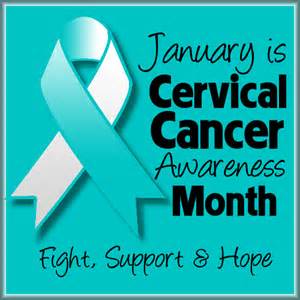
MEDIA RELEASE
From the Office of the Commissioner of Health, Dr. Gale Burstein
Date January 16, 2014
CONTACT: Mary C. St. Mary/Mary.StMary@Erie.Gov
Phone: 716.858.4941/ Mobile: 716.253.3925
January is Cervical Health Awareness Month
Learn How to Detect & Prevent Cervical Cancer
ERIE COUNTY, NY-- Unlike many other cancers, cervical cancer is preventable. This January, the Erie County Department of Health (ECDOH) recognizes Cervical Health Awareness Month and encourages residents to learn how to detect and prevent cervical cancer. “It is important for women to know their risk for cervical cancer and talk with their health care provider about how often to be screened for cervical cancer,” said Erie County Commissioner of Health, Dr. Gale Burstein.
 Cervical cancer was once one of the most common causes of cancer death for American women. But the cervical cancer death rate has decreased by more than 50% in the last 30 years, mainly as a result of cervical cancer screening programs. “There usually are no symptoms of cervical cancer in the earliest stages, so the only way a woman will find this cancer early is through regular screening,” said Burstein. Starting at age 21, women should be screened regularly for cervical cancer with a Pap test and possibly in combination with an HPV (human papillomavirus).
Cervical cancer was once one of the most common causes of cancer death for American women. But the cervical cancer death rate has decreased by more than 50% in the last 30 years, mainly as a result of cervical cancer screening programs. “There usually are no symptoms of cervical cancer in the earliest stages, so the only way a woman will find this cancer early is through regular screening,” said Burstein. Starting at age 21, women should be screened regularly for cervical cancer with a Pap test and possibly in combination with an HPV (human papillomavirus).
Females and males ages 11 - 26 years are eligible for the HPV vaccine. “The HPV vaccine can prevent cervical cancer, anal cancer and oral cancer. If you are a parent, talk to your child’s pediatrician about the HPV vaccine. Unfortunately, the Erie County rates of HPV vaccination for adolescent females aged 13-17 years was only 30% in 2012. This is far below the New York State Prevention Agenda’s goals. We have a lot of work to do to increase those rates” stated Burstein.
In addition to HPV infection, other factors that increase a woman’s risk of developing cervical cancer include: not having regular Pap tests; not following up with your health care provider if you had a Pap test result that is not normal; having HIV (the virus that causes AIDS); having another condition that makes it hard for your body to fight off health problems; and smoking.
“All women are at risk for cervical cancer,” said Burstein, “but it is especially important for women who have not had a Pap test within the past five years to get screened. Six out of ten cervical cancers occur in women who have not received a Pap test in the past five years or longer.”
For uninsured women age 40 and older, the Erie County Cancer Services Program provides access to free cervical cancer screening. To find a local program contact 716-858-2962 or visit http://www.cspwny.org for additional information and eligibility requirements. In addition, all health insurance plans participating in the New York State of Health: The Official Health Plan Marketplace, cover cervical cancer screening at no cost.
For more information
Erie County Department of Health – www.erie.gov/health
New York State of Health -- https://nystateofhealth.ny.gov/
HPV Vaccine -- http://www.health.ny.gov/diseases/communicable/human_papillomavirus/index.htm
Cervical Cancer -- http://www.health.ny.gov/diseases/cancer/cervical/
Centers for Disease Control and Prevention -- http://www.cdc.gov/vaccinesafety/Vaccines/HPV/#data

